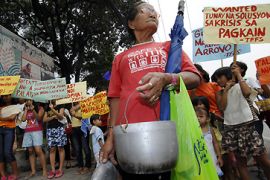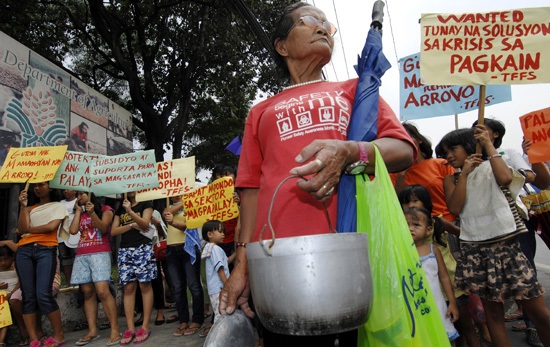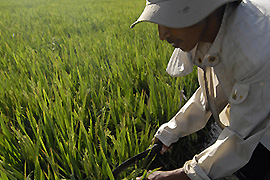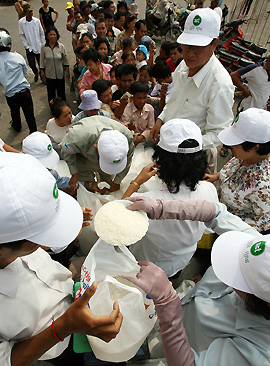Asian rice crisis starts to bite
Soaring price of staple food for millions sparks protests and worries governments.

 |
| Fluctuations in rice prices and shortages in supply could potentially touch off unrest [AFP] |
Cambodia has become the latest Asian country to impose restrictions on exports of rice – the staple food for half the world’s population.
Keep reading
list of 4 itemsWorld’s coral reefs face global bleaching crisis
Why is Germany maintaining economic ties with China?
Australia’s Great Barrier Reef suffers worst bleaching on record
The government announced the two-month export ban to ensure “food security” on Thursday, blaming surging overseas demand – particularly in Africa and the Middle East – for the skyrocketing cost of rice.
| Your Views |
Worldwide rising demand has seen rice stocks plummet to their lowest in about three decades, with average prices doubling over the last five years.
Earlier this month the UN secretary general warned that global food stocks had fallen to their lowest level in decades, driving prices up and threatening millions with starvation.
That is worrying governments – especially in the poorer Asian nations where a rise of even a few cents can for millions mean a difference between surviving or going hungry.
Earlier this month, the rising cost of rice brought protesters onto the streets of the Indonesian capital, Jakarta.
And recently the Philippines, the world’s top importer of rice, asked Vietnam, the world’s number two exporter, to guarantee supplies.
Growing anxiety
It was an unusual plea, and seen as a sign of growing anxiety among nations over how they will feed their people.
 |
| Rice is a staple crop for hundreds of millions across Asia [AFP] |
Already many rice farmers in the Philippines are being extra vigilant about their planting techniques, saying they cannot afford to loose a single grain come harvest.
The government is trying to play down the problem, but farmers say the country is facing a serious supply crisis.
“The population of the Philippines is growing, now its 87 to 90 million people,” Jimmy Tadeo of the National Rice Farmers Council told Al Jazeera.
“But the use of land for rice is shrinking. The government has not prepared for this dilemma.”
Like many countries in Asia, rice is the staple food in the Philippines.
Generous amounts are served in restaurants and cafeterias, but much goes to waste.
Now the Philippine agriculture ministry has told the restaurant owners to start dishing up smaller portions.
‘Big burden’
Filipinos consume nearly 12 million tones of rice each year but the government’s National Food Authority says it is finding it increasingly hard to source supplies.
This week the government signed a deal with Vietnam for a shipment of one and a half million tones.
 |
| Cambodia’s government is selling stockpiled rice in a bid to halt soaring prices [AFP] |
“The price of rice may go up but we won’t have a shortage, the supply will continue,” said Gloria Arroyo, the Philippine President.
Certain rice varieties, she has promised, would to be kept affordable for poorer households.
But a growing number of consumers say prices are still too high.
“It’s too much, it has added a big burden to our budget,” one shopper in the capital, Manila, told Al Jazeera. “Rice is really expensive now”
The Philippine rice industry says the global crisis is just one part of the problem.
Other significant factors, it says, are a slowdown in domestic production and corruption in the supply chain.
The government has blamed black-market traders for fuelling the rise and says it will clamp down on anyone who artificially jacks up prices.
“There are traders out there who are taking advantage of the situation,” Arthur Yap, the Philippine agriculture secretary told Al Jazeera.
“So we have asked the national food authority to me more stringent.”
Rice shortages have been politicised in the Philippines and could well be once again.
In an effort to fend off the crisis the Philippine government has unveiled plans to boost production by planting an additional 2.7 million acres during the coming rainy season.
Critics however say it’s a damage control measure in a country where rice has always been a politically sensitive crop.